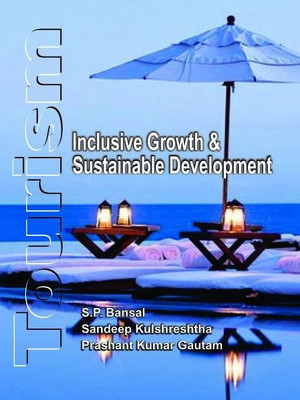Tourism:Inclisive Growth & Sustainable Development(English, Hardcover, Prof.S P Bansal,Prof.Sandeep Kulshreshtha,Dr.Prashant Gauttam)
Quick Overview
Product Price Comparison
ŌĆ£We recognize that people are at the center of sustainable development and in thisregard, we strive for a world which is just, equitable and inclusive and we commit towork together to promote sustained and inclusive economic growth, social development,environmental protection and thereby to benefit allŌĆØŌĆ”ŌĆ”ŌĆ”ŌĆ”..Rio+20 Outcome document, The Future We Want,June 2012 (paragraph 6)United Nations Conference on Trade and Development (UNCTAD XIII, Doha ŌĆō Qatar2012) has noted that tourism is primarily a private-sector-driven activity. However,without effective, coherent and coordinated government policies and actions in othersectors on which tourism activities depend, tourism would fail to exploit fully its potentialfor inclusive and sustainable growth and development. Worse, financial leakages, thatis, the loss in tourism revenue due to the need to procure tourism-related goods andservices from abroad, can significantly erode the positive economic benefits of tourismand make a country vulnerable to adverse environmental, social, cultural and economicimpacts. Since always, there is a point of discussions that whether tourism helps acommunity become more attractive and prosperous or it brings changes in the indigenoussocial pattern. Advocates of tourism vouch for economic development as with tourismprocess the money flow in community and as result the community develop. But on theother hand some oppose tourism process on account of negative impacts. However, manyfactors need to be evaluated when community leaders design their master plan forlocal development. These factors include land use, transportation, education, utilities,fire and police protection, government regulations, labour, housing and commercialand industrial activity. Many people are involved in the tourism development processand all these people have a stake in the destinationŌĆÖs future. They voice their dreams;experiences, wishes and discontent, and tourism development can take these into account.Some voices are loud, others silent or unheard. Not necessarily because stakeholdersin tourism want them to be so, but because the destination functions in such manner.The present book ŌĆśTourism: Inclusive Growth and Sustainable DevelopmentŌĆÖ is a collectionof assorted researches that addresses a large vista of tourism related issues. The researcharticles are all, in their own part, notable scholarly contributions documenting diverseaspects and studies related to the tourism.This book seeks to fulfil the needs of tourism planning, and has thus engaged itself insix sections, with issues ranging from status of tourism industry, issues related withthe development of this industry and the future perspective of the industry. In nutshellthis book is going to provide critical insights into how theoretical concepts and frameworksare applied in tourism planning and policy making practice at different spatial scales.ŌĆ£The things we fear most in organizations - fluctuations, disturbances, imbalances -are the primary sources of creativity.ŌĆØŌĆ”ŌĆ”ŌĆ”ŌĆ”ŌĆ”ŌĆ”ŌĆ”ŌĆ”ŌĆ”ŌĆ”ŌĆ”ŌĆ”ŌĆ”..Margaret J.Wheatley


